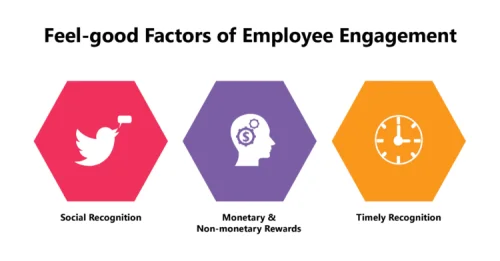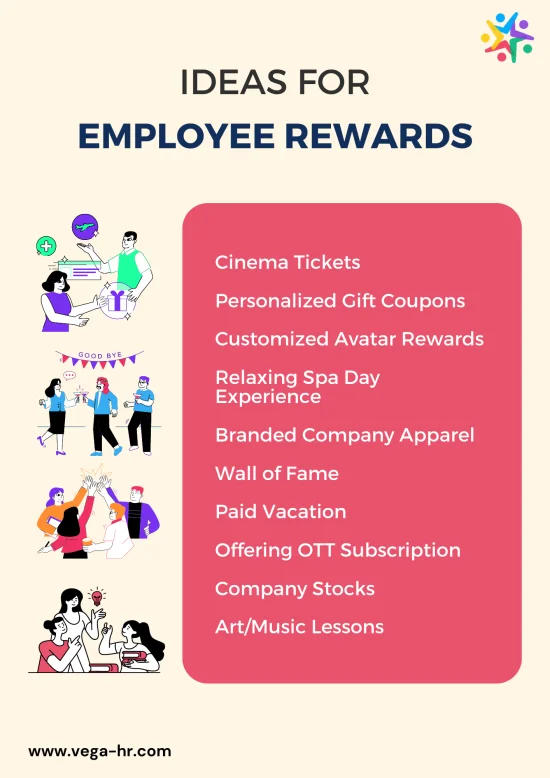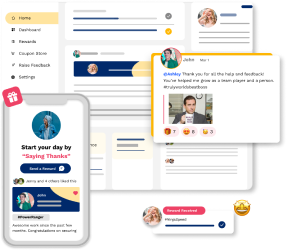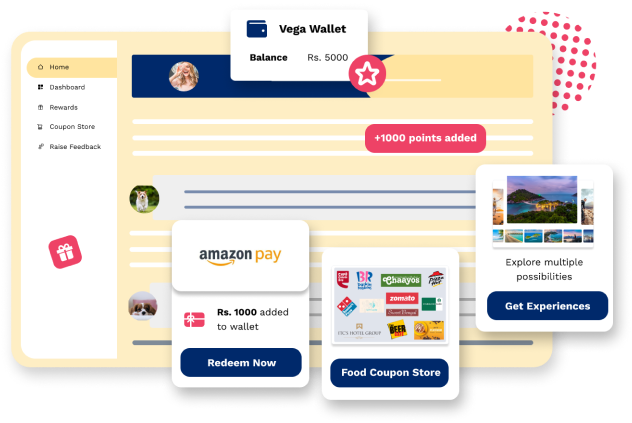Introduction
In the current challenging work climate, retaining employees has become a significant struggle for HR professionals. Employees dedicate their efforts to their jobs and like to feel valued and appreciated for their contributions, considering that the organization relies on them.
One effective approach for employers to showcase their sincere appreciation and gratitude is by implementing an employee rewards and recognition program within their organization. Such programs foster a sense of belonging and significance among employees, reducing the likelihood of them seeking opportunities elsewhere.
Our discussion will encompass the definition of employee rewards and recognition programs, the benefits they offer, and a range of ideas to inspire your own program. Let's delve into this topic and get started!
What are Employee Rewards and Recognition Programs?
Let's begin by defining the terms "recognition program" and "rewards program" before delving into the details of such programs.
Employee recognition goes beyond a rewards program, although rewards can be incorporated into it. So, what sets them apart?
Rewards are tangible in nature, representing concrete assets. They can include monetary incentives like gift cards or food items, additional time off, or even exciting trips to various destinations.
In contrast, recognition is intangible and typically more cost-effective than rewards (according to a study by IRF). It revolves around emotions and can be expressed through verbal acknowledgments during meetings or written appreciation in emails or notes. Recognition can also take the form of public praise, such as a shout-out or a high-five in a newsletter or on the organization's communication platform, visible to everyone.
Keep Your Team Engaged and Motivated
- Send rewards and shortcuts
- Built a sense of purpose
- Hybrid-work friendly rewards
- Showcase your core values
Contact Us
The bottom line is that your employees spend a large chunk of their lives working within your organization and they want to feel they are an important part of it, and one way to accomplish this is to let them know their efforts are not being unnoticed and that their contributions do in fact make a difference. This is a major benefit of implementing an employee rewards and recognition program. In fact, let's take a deeper dive into some other benefits.
What are the benefits of rewards and recognition?
When determining whether to implement an employee recognition program, it is important to know how your organization will benefit from it. After all, it will cost you time, effort, and some money to get it going. So here is an outline of pros to consider,
Did you know?
Gallup found that those employees who received the level of recognition that they needed were 56% less likely to be searching for another job
.

1. Employee Retention: We are still in the midst of the Great Resignation as according to a survey, 75% of employees are currently engaged in job-seeking activities and intend to secure a new job within the upcoming six months. Through the consistent implementation of a strong employee recognition program, you can strengthen your retention strategy and foster a sense of commitment among employees, reducing turnover rates.
2. Increased Motivation, Engagement, and Productivity: When employees feel that their work is valued, they become more motivated, engaged, and productive. Gallup reports that recognized employees are 4x more engaged in their work, resulting in enhanced productivity, which greatly benefits the organization.
3. Stronger work relationships and teamwork: Organizations that encourage peer-to-peer recognition alongside recognition from leadership foster stronger relationships among employees and team members. This not only cultivates a positive work environment but also promotes collaboration across the organization.
4. Deepened Sense of Company Values: By aligning your employee recognition program with your organization's core values, mission, and goals, you consistently reinforce and promote these standards each time an employee is acknowledged. According to Globoforce, 83% of HR professionals agree that employee recognition strengthens company values, making it an effective tool for building a strong company culture.
5. Enhanced Employer Branding: Content and satisfied employees are more likely to speak positively about your organization to their friends, family, and professional networks. This positive word-of-mouth can contribute to building a favorable brand image and attracting top talent. Gallup reveals that happy employees are 4x more likely to recommend your organization as an excellent place to work.
6. Cost Savings in the Long Run: According to SHRM, the average cost for recruiting and hiring a single employee in the USA is $4,700. By implementing an effective employee recognition program, you can reduce turnover rates and save your company thousands of dollars in recruitment costs, leading to significant bottom-line savings.
As you can see many great benefits come with the implementation of an employee recognition program. Now let us just look at a few of the ideas we could incorporate for having a recognition program.
Ideas for Recognition Program:
Tailored Recognition
Personalization is not only crucial for achieving success in sales and marketing; it also plays a significant role in employee retention. By making an effort to understand your employees' personal information such as their birth dates, interests, hobbies, or their children's birthdays, you can show genuine appreciation.
Taking the time to congratulate an employee on their child's birthday and offering them a day off to celebrate can have a profound impact on retaining top talent within your team. When employees feel personally recognized, they develop a sense of attachment to the company.
This fosters loyalty and boosts productivity levels.
Utilizing Social Media for Recognition
A significant majority of your workforce, exceeding 70%, actively engages with social media platforms. Considering this, it is highly likely that your employees are connected to your corporate social media channels. Leveraging social media to express appreciation can be a powerful means of public recognition, yielding remarkable outcomes for the entire organization.
On social media, you have the opportunity to extend birthday wishes, commemorate service anniversaries, and acknowledge notable achievements of your employees. Crafting a post that includes a photograph of the employee along with some pertinent details can be an impactful approach.
In addition to being an effective recognition strategy, such posts contribute to establishing your company's reputation as a preferred employer. They serve as a direct manifestation of your commitment to acknowledging the contributions of your workforce. Furthermore, these posts possess high shareability, attracting potential candidates to your social media platforms.
A Wall of Fame for Employee Recognition
A Wall of Fame is a powerful employee recognition tool that celebrates exceptional achievements and inspires excellence within the organization. It can be a physical or digital display showcasing employees' accomplishments and contributions. The selection process should be fair and transparent, based on objective criteria aligned with the company's values. Regular updates ensure its relevance and maintain a positive and high-performance culture.
It reinforces the organization's values and boosts employee morale and engagement. Overall, it creates a visible reminder of success and fosters a culture of appreciation and motivation.
Peer-to-Peer Recognition
Peer-to-peer recognition involves acknowledging and appreciating the efforts of colleagues within the workplace. It allows peers to provide authentic and timely recognition, boosting morale and increasing employee engagement. Peer recognition brings diverse perspectives and insights, strengthening relationships and teamwork. To implement it effectively, organizations should encourage a culture of appreciation, provide recognition channels, lead by example, and offer training and resources.
Trophies
Trophies serve as meaningful accolades within employee recognition programs, motivating employees to strive for excellence and align their interests with the company's goals. One approach is to acquire a trophy that will be passed on to a deserving employee for a month, proudly displayed on their workstation. After the designated period, the trophy will be rotated to another deserving individual.
These trophies can be awarded to employees who have showcased exceptional performance, such as those who consistently deliver outstanding customer service. It is important to clearly communicate the significance of the trophy before presenting it, highlighting the accomplishments it represents.
Personalized Swag
Personalized swag is a thoughtful and effective way to recognize employees. Customizing gifts with their names or initials, adds a personal touch. Whether it's branded apparel, accessories, or useful items, personalized swag shows that you value their individuality. It creates a sense of belonging and boosts employee morale. The uniqueness of personalized swag makes it a memorable and appreciated form of recognition.
Workcations
Rewarding employees with a workcation is a fascinating concept that combines work and vacation. It offers employees the chance to work remotely while enjoying a captivating vacation-like experience. By providing this unique reward, employers recognize their hard work and provide an opportunity for rejuvenation. This enticing incentive allows employees to recharge in a different environment while maintaining their productivity. Ultimately, a workcation serves as a captivating and beneficial reward for employees' dedication and commitment.
Handwritten/ Thank-you note
Within these notes, convey your genuine gratitude for their dedicated efforts on a project, or task, or their overall positive attitude towards their workload. This considerate gesture serves as a meaningful reward, making your employees feel valued and cherished. It also demonstrates your attentiveness towards each individual and their unique contribution to the company's achievements, fostering a sense of recognition and connection.
Anniversary celebrations
To foster a sense of belonging among your employees, it is crucial to make their journey within the organization meaningful. One effective approach is to celebrate their birthdays and work anniversaries. By sending personalized emails or organizing small team gatherings to mark the occasion with a cake-cutting ceremony, you can demonstrate that your company values and appreciates everyone. Going the extra mile to make employees feel special on their day entails granting floating days off, arranging for the delivery of cakes, pastries, or cookies, hosting team parties, or even sending flowers to their homes.
Now, after looking at these various recognition ideas let us shift our focus toward some of the rewards program ideas.
Ideas for Rewards Program:

Monetary Rewards For Employees
Extra cash is a valuable form of reward. For employees who have financial goals, money can be a powerful motivator. Employers can offer cash rewards to acknowledge exceptional performance, surpassing expectations, or achieving set goals. This not only fosters a sense of purpose and accomplishment but also provides satisfaction from a job well done.
Gift Cards
Gift cards serve as a compelling monetary incentive, often even more impactful than cash. Employers can personalize gift cards based on employees' preferences and interests. By choosing carefully, gift cards can make a lasting impression, particularly when employees use them to purchase something meaningful or to enjoy a personal experience. Gift cards can be tailored to fit within the company's budget while conveying appreciation.
Profit Sharing
Profit sharing involves providing employees with a portion of the company's earnings or profits over a specific period. This can be in the form of cash, business stocks/ ESOPs, or contributions to retirement funds. Profit-sharing plans are often offered in addition to regular pay, bonuses, and benefits. By linking employee rewards to the company's success, profit sharing motivates employees to work collaboratively towards achieving organizational goals, knowing that their efforts directly contribute to their own financial rewards.
Want To Strengthen Your Company’s Equity Management?
But managing ESOPs manually can be a hassle for organizations of different scales.
To tackle this problem, you can explore our ESOPs management solution
Retention Bonus
A retention bonus, also known as retention pay, is a lump sum of money offered to employees as an incentive to remain with the company. This approach is typically employed during critical periods or projects to persuade key employees to stay for a specified duration. Retention bonuses are an effective tool to retain valuable and high-level employees within the organization, ensuring continuity and stability during crucial times.
Enhancing Health and Wellness
The well-being of employees significantly impacts their performance within a team. Offering incentives related to their health needs not only boosts their motivation but also enriches their overall wellness. An effective approach to health and wellness incentives is providing memberships to activities that align with individual preferences. For example, one employee may value a gym membership, while another may prefer joining a paid yoga club. Additionally, considering the importance of mental health, direct access to services like therapy can be offered to support employees in maintaining their well-being.
Engaging Team Outings
Organizing enjoyable team outings serves as an excellent incentive to reward a sizeable group of employees. For instance, you can arrange team-building events specifically tailored for a department, providing an opportunity for workers to participate in fun activities while on the job. These exciting off-site experiences not only serve as a motivating factor for other departments to reach their goals but also promote teamwork and enhance communication skills among the participants.
Providing Tech Accessories
Providing tech accessories incentives program for employees, such as speakers, wireless earphones, and more, is a fantastic way to motivate and reward them. Additionally, you can offer these rewards in the form of discount coupons or partial funding towards an employee's desired gadget. This not only serves as a reminder that hard work yields rewards but also demonstrates your company's willingness to invest in top-notch gadgets for deserving team members.
Offering Employees Event or Festival Ticket
By attentively considering each employee's interests, you can provide some event tickets that align with their preferences. For instance, if you have a team member who supports an out-of-town IPL team, consider gifting them tickets for a game when their team competes against the local IPL team. This personalized approach demonstrates your thoughtfulness and enhances the value of the rewards for your employees.
Investing in Employee Education
Demonstrate your commitment to your employees' professional growth by investing in their ongoing education. This can be achieved through various means, such as providing training opportunities and leadership classes. By offering these resources, you convey your appreciation for their contributions and express a genuine desire to see them thrive within your organization. Additionally, you might consider implementing a tuition reimbursement program to support employees who wish to pursue college courses to advance their careers. Such initiatives not only empower individuals to develop new skills and knowledge but also foster a culture of continuous learning and professional development within your company.
Conclusion
Building a positive work environment through the implementation of an effective rewards and recognition program is essential for organizations seeking to retain their valuable employees there are times when employers are unable to build a proper rewards and recognition program, but the ideas mentioned today would put them on track. By incorporating employee rewards and recognition programs, organizations would strengthen interdepartmental connections, foster a sense of belonging, and promote collaboration henceforth boosting their commitment and productivity.
About Vega HR
Vega-HR is a powerful tool in the talent war, offering employee rewards, recognition, and pulse recognition. With an engaging platform, it fosters a world-class work culture, providing P2P recognition, social feedback, on-spot recognition, and monetizable incentive solutions with 3000+ coupons in various categories.
Create a Culture People Want to Stick to
- Send rewards
- Give shoutouts
- Build a community
- Gift experiences
Get a demo
 Written by Mayank 19 July 2023 | 4 min read
Written by Mayank 19 July 2023 | 4 min read







